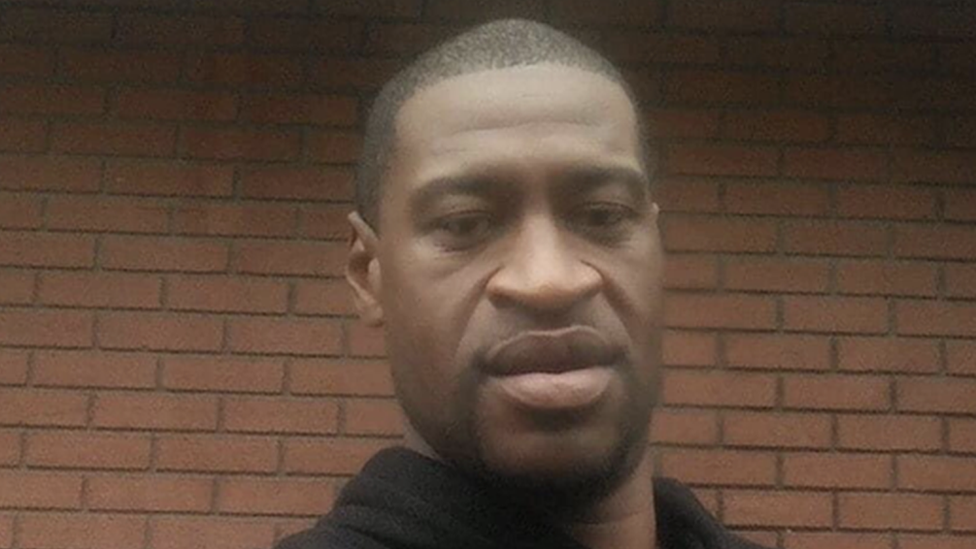George Floyd: Biden 'praying for right verdict' in Chauvin trial
- Published
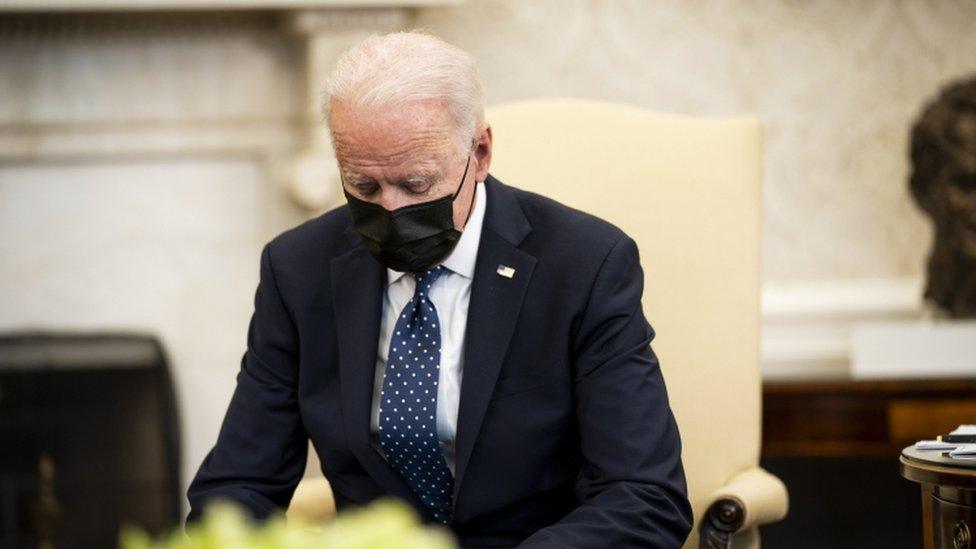
The president told reporters on Tuesday: "I'm praying the verdict is the right verdict"
US President Joe Biden has said he is praying for the "right verdict" in the trial of Derek Chauvin, the Minneapolis ex-policeman accused of killing George Floyd last year.
Mr Biden, who spoke to Mr Floyd's family on Monday, implied he felt the evidence was "overwhelming".
His comments came as the jury meets for a second day to consider its verdict.
Mr Chauvin, 45, was filmed kneeling on Mr Floyd's neck for more than nine minutes during his arrest last May.
He is on trial for charges including second-degree murder and has pleaded not guilty.
The footage of Mr Chauvin, who is white, with his knee on African-American Mr Floyd's neck sparked global protests against racism. Cities around the US are bracing for renewed protests regardless of the verdict.
What did Biden say?
White House spokeswoman Jen Psaki said the president spoke to Mr Floyd's family on Monday to "check in with them and also share that the family was in his prayers".
"The jury is sequestered... he certainly is not looking to influence [the trial]," she added.
Mr Biden spoke in more detail about the call at the White House on Tuesday. "I can only imagine the pressure and anxiety they are feeling," he said of the family.
"I waited until the jury was sequestered and I called [them]," he said. "They're calling for peace... no matter what that verdict is."
"I'm praying the verdict is the right verdict," Mr Biden added. "I think it's overwhelming in my view."
Earlier on Tuesday, Mr Floyd's younger brother confirmed that he had spoken to the president.
"[Mr Biden] knows how it is to lose a family member, and he knows the process of what we're going through," Philonise Floyd told NBC News. "He was just letting us know that he was praying for us."
Mr Biden lost his first wife, Neilia, and baby daughter, Naomi, in a car accident in 1972. In 2015, his son Beau died of brain cancer at the age of 46.


This afternoon I asked Press Secretary Jen Psaki what Biden saw as his responsibility, as president, at the conclusion of the trial.
She said this is an "extremely painful moment" for people "who are tired of seeing one person after another lose their life at the hands of law enforcement".
"He's aware of that," she added, "and the need for reform."
That may be the case, but Biden just positioned himself into the middle of a social and political tinder-box just a day after the presiding judge in the trial warned politicians to "stop talking about the case" and that their failure to do so was "abhorrent".
That tinder-box could explode depending on the outcome of the trial, and Biden will be judged on how he handles the resulting fallout.
By effectively taking sides, his ability to serve as a leader for this divided nation may prove all the more challenging.

What's the latest with the trial?
The jury has retired to consider testimony from 45 witnesses, including doctors, use-of-force experts, police officers, bystanders and people who were close to Mr Floyd.
Mr Chauvin is charged with second-degree unintentional murder, third-degree murder and manslaughter. He faces up to 40 years in prison if convicted of the most serious charge - second-degree murder.
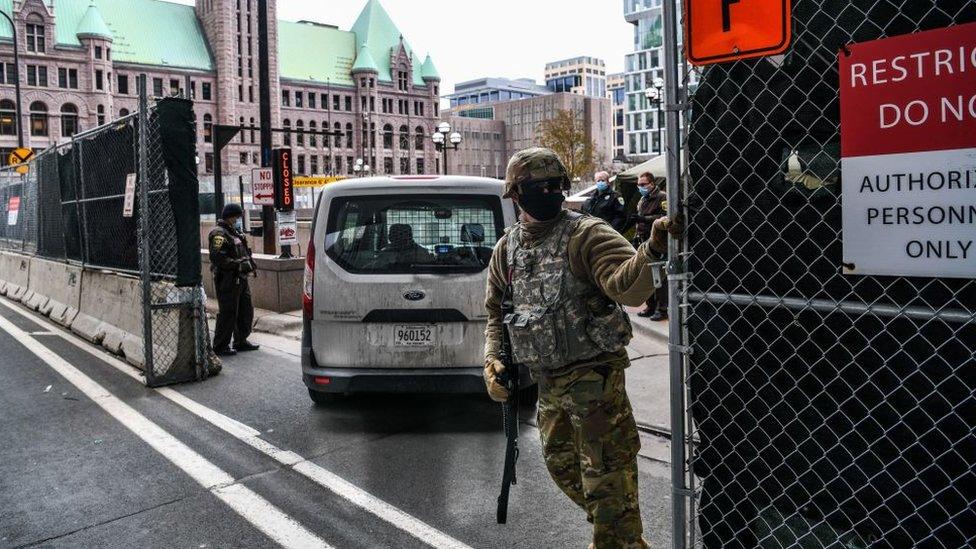
Security has been ramped up in Minneapolis ahead of the verdict
A conviction on any of the counts against him will require the jury to return a unanimous verdict. A single juror holding out would result in a mistrial, but the state could then try Mr Chauvin again.
Of the 12 jurors, six are white, four are black and two are multiracial. Seven are women and five are men.
On Monday, the governor of Minnesota, Tim Walz, requested security assistance from the states of Ohio and Nebraska ahead of the verdict.
What does the defence argue?
The prosecution and defence made their closing statements on Monday following a trial that lasted three weeks
Mr Chauvin's lawyer Eric Nelson argued that his client did what any "reasonable police officer" would have done after finding himself in a "dynamic" and "fluid" situation involving a large man scuffling with three officers.
Watch: The three key arguments used by Chauvin's defence
The defence has sought to show that drugs may have caused Mr Floyd's death.
Mr Nelson argued that Mr Floyd's drug use was "significant" because the body reacts to opioid use, specifically in the case of someone who had been diagnosed with hypertension and high blood pressure.
The lawyer also argued that his client was unlikely to have intentionally violated use-of-force rules as he would have been aware that the whole interaction was being recorded.
And what about the prosecution?
Prosecutors have tried to prove Mr Chauvin's use of force resulted in Mr Floyd's death.
Prosecutor Steve Schleicher urged jurors to "use your common sense. Believe your eyes. What you saw, you saw," referring to the video showing Mr Chauvin kneeling on Mr Floyd.
"This wasn't policing; this was murder," he added.
Watch: How the prosecution made its case against Derek Chauvin
Prosecutor Jerry Blackwell had the final word on Monday. He said the matter was "so simple that a child can understand it".
"In fact, a child did understand it, when the nine-year-old girl said, 'Get off of him,'" Mr Blackwell said, referring to a young onlooker who objected. "That's how simple it was. 'Get off of him.' Common sense."
- Published20 April 2021
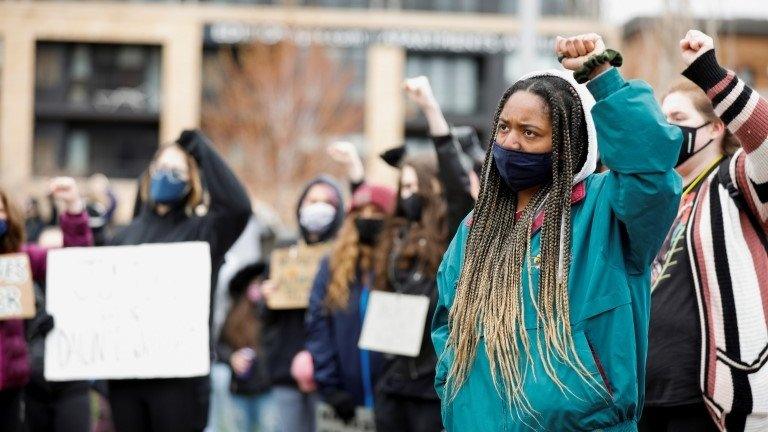
- Published10 March 2021
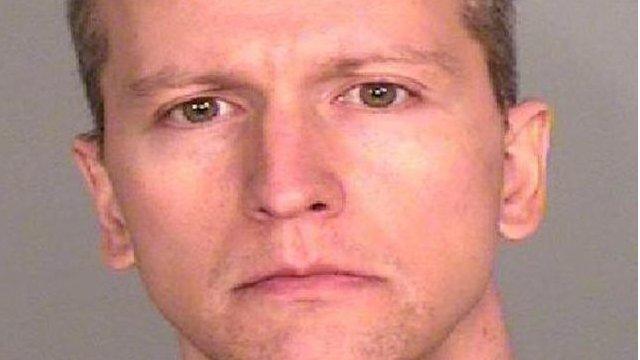
- Published24 March 2021
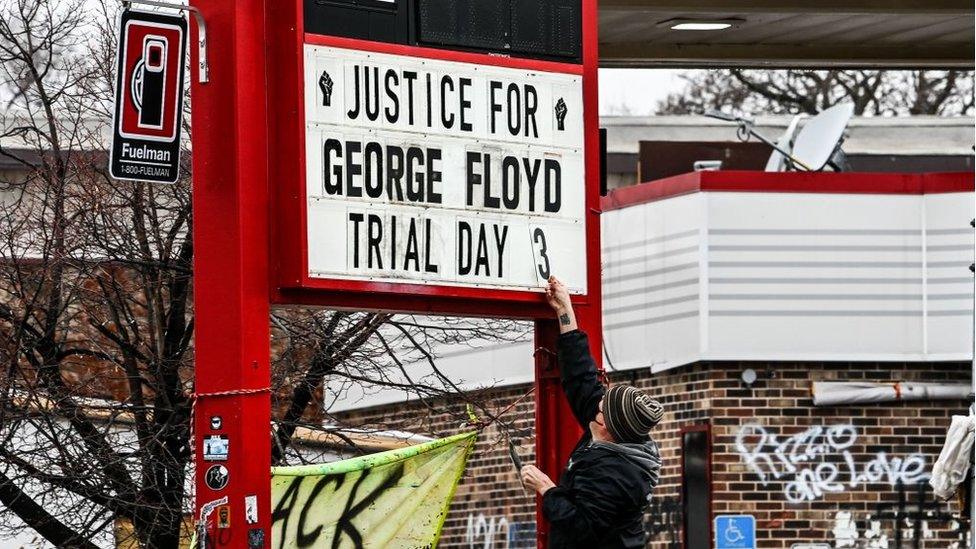
- Published16 July 2020
